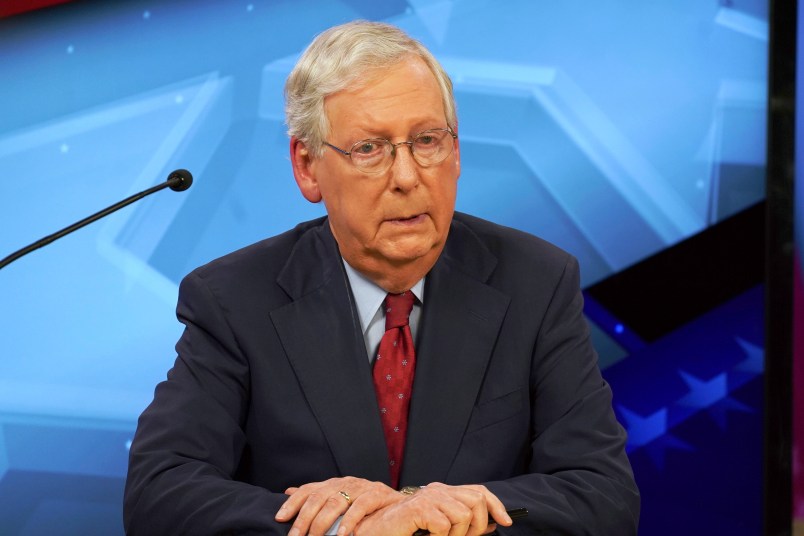This article is part of TPM Cafe, TPM’s home for opinion and news analysis.
We’ve known for some time that Senate Republicans were laying the groundwork to obstruct the new administration, particularly when it came to opposing President Biden’s Cabinet nominees. And today, even though almost all of Biden’s crisis-tested and historically diverse Cabinet has been confirmed, we cannot forget that Republicans tried — and ultimately failed — to derail the incoming Biden administration. And we cannot forget that this opposition was driven not simply by Senate Republicans’ partisanship and a desire to score political points, but also in a deliberate effort to protect their special interest allies and corporate donors.
Gearing up for obstruction
Following President Biden’s win, but before losing their majority in early January, Senate Republicans blew up the longstanding bipartisan tradition of moving the confirmation process forward during the lame-duck period. Instead, they did nothing, waiting to see if they’d maintain control of the Senate — where they would have the power to obstruct Biden’s nominees even further. The obstruction continued as Mitch McConnell, soon to lose the majority when Vice President Harris was sworn in and became the tiebreaker in the 50-50 Senate, refused for weeks to agree to a simple organizing resolution — a procedural step that would allow Senate Democrats to start confirming Biden’s nominees, the work he and his party refused to do.
We don’t have to wonder what would happen if the shoe was on the other foot. In 2001, in a 50-50 Senate with Democrats in control ahead of President Bush’s inauguration, Senate Democrats put political differences aside to make sure the incoming administration had its Cabinet in place as soon as possible. In 2021, amid a global pandemic and after former President Trump and members of their own party helped incite a violent insurrection on our U.S. Capitol, Senate Republicans failed to do the same.
Obstruction threatened national security, public health
Instead of moving to quickly confirm key Cabinet posts, Senate Republicans sat on their hands — national security and public health be damned. Just weeks after the deadly insurrection at the U.S. Capitol, Senate Republicans took aim at President Biden’s nominee for secretary of the Department of Homeland Security (DHS), Alejandro Mayorkas. Despite a rare warning from DHS of “heightened threats from violent domestic extremists” emboldened by the assault on the Capitol Senate Republicans put up procedural roadblocks to delay Mayorkas’ confirmation, leaving the top national security post unmanned for nearly a month after the insurrection.
Now-Secretary of Health and Human Services, Xavier Becerra also faced unprecedented obstruction during his nomination process at the hands of Republican senators. Though he was nominated in early December, Becerra was not confirmed until March 2021, leaving the department that oversees the pandemic response and vaccine distribution without its top official months into the new administration. Realizing they wouldn’t have power to stop most — if any — of Biden’s nominees, Senate Republicans tried to make an example out of Becerra, with a top Republican official close to Sen. Tom Cotton (R-AR) claiming in February that Becerra “ought to be the one who goes down.” These tactics failed, and only delayed Becerra’s inevitable bipartisan confirmation.
Another top target for Senate Republicans was Congresswoman Deb Haaland, President Biden’s nominee for Secretary of the Interior. Her confirmation is historic; as the first indigenous person to serve in a president’s Cabinet, Haaland brings a long-overdue voice for Native Americans to the Interior Department. Haaland is also an environmental champion who understands the pressing need to seriously address climate change and protect our public lands, with a bipartisan record for getting things done in the House. So naturally, senators backed by the oil and gas industry — which wants to continue to extract without limit from federal lands — launched a major opposition campaign to Haaland’s nomination.
Despite their best efforts, Senate Republicans’ attempts to sink or damage Biden’s nominees ultimately failed because the American people saw through them. In addition to the rank hypocrisy Biden’s nominees experienced compared to the treatment of President Trump’s nominees, many Republican senators made it clear that they were acting on behalf of special interests — most notably the pharmaceutical and oil and gas industries.
In many cases, they didn’t even try to hide their motivations: Sen. John Cornyn (R-TX) said the quiet part out loud when he voiced opposition to now-Secretary Becerra because he wasn’t a pharmaceutical executive like President Trump’s HHS secretary, Alex Azar. Sens. Steve Daines (R-MT) and John Barrasso (R-WY) were vocal about their concerns for the extraction industries in their states, while ignoring the tribal voices and environmentalists back home that supported Haaland’s nomination. Ultimately, these attacks all fell flat and each of these nominees was confirmed with bipartisan support.
President Biden promised to appoint qualified nominees from diverse backgrounds in order to build a Cabinet that looked more like America, and that’s exactly what he did. Instead of celebrating the administration’s many historic confirmations, Senate Republicans spent months delaying, obstructing, and attacking these nominees to protect the needs of their special interest donors. As President Biden’s administration gets to work to upend the status quo and build an economy that prioritizes working families over corporations, the senators who tried to block progress should be remembered for their actions.
Kyle Herrig is the president of the anti-corruption group Accountable.US, a nonpartisan watchdog group.






